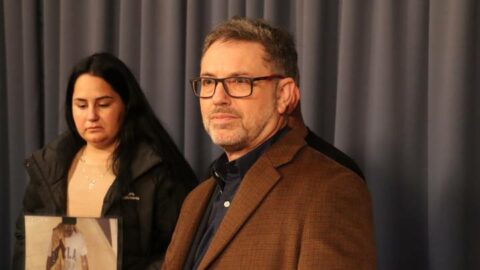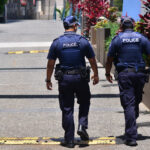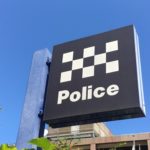NSW Police Force Attempts to Suppress Evidence Relating to Fatal Mental Health Shooting

Five NSW Police Force Tactical Operations officers stormed the home of Todd McKenzie at 10.15 pm on 31 July 2019, following a nine hour siege.
An officer shot and killed the 40-year-old Taree man, whom it was well known suffered from mental health issues, claiming that he’d lunged at officers with a knife.
These were specialist officers trained to deal with standoff situations and armed with a variety of different weapons – both lethal and nonlethal – who were confronting a distressed man suffering a schizophrenic episode, who was only armed with kitchen implements.
Officers arrived at 1.15 pm that afternoon, after a neighbour reported seeing McKenzie on his veranda carrying a knife. During the standoff, Todd was alone in his house, posing no threat to anyone and officers claim that on entry, the initial use of tasers had proven ineffective.
Three years on and McKenzie’s family are still waiting for answers that they’re hoping will be forthcoming during the inquest, however NSW police are making this prospect less likely, as the commissioner is currently attempting to suppress key information from coronial hearings.
On having NSW deputy state coroner Harriet Grahame refuse to keep this evidence out of the public domain, the police commissioner petitioned the NSW Supreme Court, which has ordered the matter back to the Coroner’s Court later this month, so it can reconsider whether to withhold the details.

An unnecessary intervention
“These are matters ultimately for the coroner,” said National Justice Project director George Newhouse, “but Todd’s mother is extremely concerned that there was no need for the officers to enter the premises at all and that her son would be alive today if they had not.”
“This process is incredibly traumatic for family members who have lost a son and loved one,” the solicitor, who’s representing McKenzie’s mother June Wilkins, told Sydney Criminal Lawyers.
The family question why over the nine hour standoff, they, their son’s psychiatrist or his local GP hadn’t been called in to talk Todd around, which was something that had happened before. They also query why officers found it necessary to storm the house when he was posing no threat.
McKenzie’s aunt Francene Reo told reporters on the day after the shooting that, “It’s something that has been happening again and again and again, when you have somebody who has an acknowledged mental health problem, they have an incident, and they end up dead.”
“The police do have from time to time a difficult job to do,” Newhouse continued, “but where you have a situation where the individual involved is having a mental health crisis and is not harming anyone or themselves, perhaps a less forceful response is appropriate.”
Suppressing the evidence
Then NSW police assistant commissioner Max Mitchell told reporters at the time of the incident that officers allegedly attempted to use nonlethal methods to subdue McKenzie on entry, but these proved unsuccessful.
“Nonlethal tactics by tactical police were utilised, which included the use of tasers, but all nonlethal actions were ineffective,” Mitchell told the press. “And unfortunately and tragically, this man was shot as a result of the conflict by a police officer.”
NSW police commissioner Karen Webb is currently calling for certain details regarding the Tactical Operations unit to be withheld. This includes the different type of taser the specialist officers use, as well as a manual that outlines their firearms, ammunition and training drills.
The Daily Telegraph reports that NSW police claims that this information could be used against its officers and, in a worst-case scenario, lead to increased terrorist activity. However, the Supreme Court and the coroner fail to see how any actual risk is involved.
While the family is pushing for full disclosure, as the whole point to the inquest is to ascertain how NSW police systems didn’t work, and, if these procedures and protocols aren’t scrutinised, then there is no way of identifying any failed policy and improve on it to prevent further loss of life.
Policing the mentally ill
NSW police responded to over 54,500 mental health-related incidents statewide in 2019. And the state law enforcement agency continues to police these incidents, with a designated Mental Health Intervention Team.
The year following the McKenzie shooting, NSW Health rolled out its PACER (Police, Ambulance, Clinician, Early Response) program to trial at 12 sites across Sydney and the Central Coast. This aims to provide a joint law enforcement and mental health response to such incidents.
Back in 2018, then NSW Greens MLC David Shoebridge obtained statistics relating to the number of people NSW police had shot dead over the last two decades. Officers had killed 35 individuals with firearms during the 20 years prior, 19 of whom were people with a mental health condition.
In March last year, a couple of NSW police officers came across Anaiwan and Biripi woman Tarneisha Widders on the side of the road in inner city Darlington having a panic attack, which escalated to the point where one of the officers had the woman by the neck up against a fence.
But the detrimental policing of the mentally ill is a nationwide problem, which involves police being the default response to these incidents, with officers often going on to use excessive or lethal force.
Victoria police ran down a man during a mental health incident in Melbourne in September 2020, and went on to swarm him and stomp on his head. While a WA officer shot and killed Yamatji woman JC in September 2019, whilst she was having an episode and was surrounded by police.
On receiving the fatal shooting statistics, Shoebridge told the ABC that two factors were driving the police killings of the mentally ill, which involve the under resourcing of mental health facilities and frontline junior officers dealing with incidents they’re drastically undertrained to cope with.
Preventing police shootings
As for the coronial proceedings, the McKenzie family want to see an outcome that involves police officers responding to mental health issues being accompanied by trained professionals who are able to engage with the person having an episode in a meaningful way without weapons.
While deputy state coroner Grahame has suggested that there is “very strong public interest” in having the coronial inquiry remaining open, so that an honest appraisal of the police response can be obtained.







